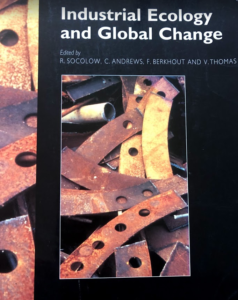Industrial Ecology and the Circular Resource Economy
How can global economic activity flourish, while also delivering against realistic and equitable sustainability commitments? How economic and environmental progress coexist, in the face of increasing global demand for all categories of products, goods and services? How can risk and opportunity be balanced?
Access to secure and reliable energy, water, agricultural and material serves as the fulcrum on which nearly all societal endeavors depend. While the modern economy has seemingly shifted from one built upon brick and mortar businesses to one of bits, atoms and electrons, a closer look reveals that the foundation of global commerce and trade still has at its’ foundation the extraction, refinement, transformation and distribution of specialty and commodity agricultural, material and energy resources. If follows that ‘material movement through the biosphere’ depends upon growing sources of reliable and clean energy.
Through the 17 Sustainable Development Goals (SDGs), the UN General Assembly has outlined a vision to guide global economic growth towards a prosperous and equitable future, with a target date for goal achievement of 2030. A closer look at the SDGs reveals that many of the principles outlined within the each of the programs are achievable and complementary, but top-down policy driven incentives will not be sufficient. Moving to a balanced sustainable economy requires economic, political and scientific/technical collaboration, and innovation will likely emerge from regions and sectors, not from individual countries and companies (a point emphasized by Parag Khanna in his book Connectography). While the information economy may be transforming the way that commercial activity is structured, the foundation of the global economy will still be largely resource based. Technological advancements notwithstanding, commodity resource/material extraction, processing, transformation and distribution will still comprise the engine driving economic flows, and therefore will remain at the cornerstone of global trade. It follows that new approaches and frameworks will be needed to support sustainable growth, and a suitable place to start is through the lens of Industrial Ecology and the Circular Economy.
Industrial Ecology (IndEcol) has been around for decades, but a more recent expansion and incorporation of principles with roots in networks science and systems science/engineering, coupled with a quasi-rebranding of IndEcol has led to what is now more broadly described as the Circular Economy. While the Circular Economy is much more visible in business circles, IndEcol can clearly be viewed as the technological pillar supporting the global connected manufacturing economy. In order for the global Circular Economy to be viable and sustainable, corporations need to start with the principles of IndEcol.
This incorporation of IndEcol principles across all industrial sectors emphasizes not only the product component, but also variables such as transport, financial markets, logistics, storage, engineering, infrastructure, recovery and reuse, among others; evolution of the Circular Economy can therefore be viewed as a more comprehensive and holistic approach to the sustainable evolution of commercial activity. Developing a better understanding of how both natural and synthetic commodity material moves through the biosphere, including physical and fiscal externalities and impacts, will allow for a more fluid blending of science and business, hopefully resulting in the realization of the objectives outlined in the SDGs. I have noted before that I believe IndEcol as a whole has experienced difficulty transitioning from lab/theory to practice. Many commercial initiatives framed under the Circular Economy rubric are oftentimes not exploiting the best available technologies and methodologies (ie, synthetic biology, sensors, advanced analytics, etc); an IndEcol systems/network approach can help foster a more efficient and scalable implementation of sustainable business practices.
At Atlas Research Innovations, we look to the network sciences, geospatial analysis and the evolution of technologies for guidance and risk management in the new economy. Along with our network partners we will be publishing articles related to the global commodity trade, applied science and technology, and the manufacturing complex, while embedding principles and developments which promote Industrial Ecology integration. Most of the discussions will cover one or more of the following themes:
– Energy
– Agriculture
– Applied Sciences
– Climate Risk & Opportunity
– Transportation
– Environment & Pollution
– Data Science
– Synthetic Biology
– Finance and Markets
– Security/Geography
– Technology
– Societal Interactions
– Geospatial Analytics
– Natural Sciences
Please visit Atlas Research Innovations if you are interested in learning more.
(this post is also viewable on Medium)
